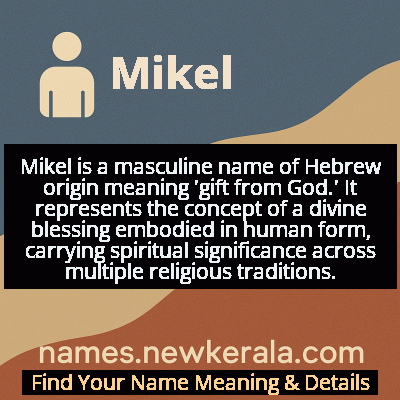Mikel Name Meaning & Details
Origin, Popularity, Numerology Analysis & Name Meaning of Mikel
Discover the origin, meaning, and cultural significance of the name MIKEL. Delve into its historical roots and explore the lasting impact it has had on communities and traditions.
Name
Mikel
Gender
Male
Origin
Hebrew
Lucky Number
5
Meaning of the Name - Mikel
Mikel is a masculine name of Hebrew origin meaning 'gift from God.' It represents the concept of a divine blessing embodied in human form, carrying spiritual significance across multiple religious traditions.
Mikel - Complete Numerology Analysis
Your Numerology Number
Based on Pythagorean Numerology System
Ruling Planet
Mercury
Positive Nature
Adventurous, dynamic, curious, and social.
Negative Traits
Restless, impatient, inconsistent, prone to indulgence.
Lucky Colours
Green, white.
Lucky Days
Wednesday.
Lucky Stones
Emerald.
Harmony Numbers
1, 3, 9.
Best Suited Professions
Sales, marketing, travel, entertainment.
What People Like About You
Versatility, charisma, adventurous spirit.
Famous People Named Mikel
Mikel Arteta
Football Manager
Led Arsenal FC to significant improvements and trophies through innovative tactics
Mikel Laboa
Musician
Revolutionized Basque music and became a cultural icon in the Basque Country
Mikel Landa
Professional Cyclist
Competed at the highest level of professional cycling in multiple Grand Tours
Mikel San José
Footballer
Successful career with Athletic Bilbao and representation of the Spanish national team
Name Variations & International Equivalents
Click on blue names to explore their detailed meanings. Gray names with will be available soon.
Cultural & Historical Significance
In religious contexts, Mikel connects to Archangel Michael, revered in Judaism, Christianity, and Islam as a protector and divine warrior. This multi-faith relevance gives the name broad cultural appeal while allowing for specific regional interpretation. The Basque version Mikel represents a unique synthesis of global religious tradition and local cultural expression, making it particularly meaningful for families seeking to honor both their faith and their heritage. Its continued popularity demonstrates how traditional names can evolve while maintaining their core significance across generations and cultural boundaries.
Extended Personality Analysis
People named Mikel are typically characterized by their strong sense of responsibility and natural leadership abilities. They often exhibit a balanced combination of traditional values and modern thinking, making them both reliable and adaptable. Their protective nature frequently manifests in caring for family and community, while their strategic mindset helps them navigate complex situations effectively. These individuals tend to be principled yet practical, combining moral conviction with realistic problem-solving approaches.
Mikels often demonstrate quiet confidence rather than overt assertiveness, earning respect through consistent action rather than loud proclamation. They typically possess strong analytical skills and the ability to see multiple perspectives, which serves them well in leadership roles. Their personality often reflects the name's meaning of being 'god-like' not in arrogance, but in their capacity for protection, guidance, and moral clarity. Many exhibit a unique blend of spiritual depth and practical competence, making them valued members of their communities and effective in professional settings that require both vision and execution.
Modern Usage & Popularity
In contemporary naming practices, Mikel maintains strong regional popularity in the Basque Country and has gained international recognition through diaspora communities and cultural exchange. While it ranks consistently high in Basque-speaking regions, its usage has spread to other parts of Spain and internationally, particularly among families with Basque heritage or those appreciating its distinctive sound and meaningful origin. The name enjoys stable rather than trendy popularity, often chosen by parents seeking a name that is both culturally significant and internationally recognizable. Recent decades have seen increased usage in multicultural contexts where parents value names that honor specific cultural traditions while remaining accessible in global settings. Its moderate but consistent popularity reflects a balance between cultural specificity and broad appeal.
Symbolic & Spiritual Meanings
Symbolically, Mikel represents the intersection of divine protection and human strength, embodying the concept of earthly beings reflecting heavenly qualities. The name carries deep metaphorical significance as a bridge between spiritual ideals and practical action, suggesting someone who brings higher principles into daily life. It symbolizes cultural resilience and identity preservation, particularly in the context of Basque heritage where the name has become emblematic of maintaining tradition while engaging with the modern world. The symbolic meaning extends to concepts of guardianship, moral courage, and the balance between individual strength and community responsibility. As a name that has maintained its significance across centuries and cultures, Mikel represents enduring values that transcend temporal and geographical boundaries while remaining rooted in specific cultural contexts.

